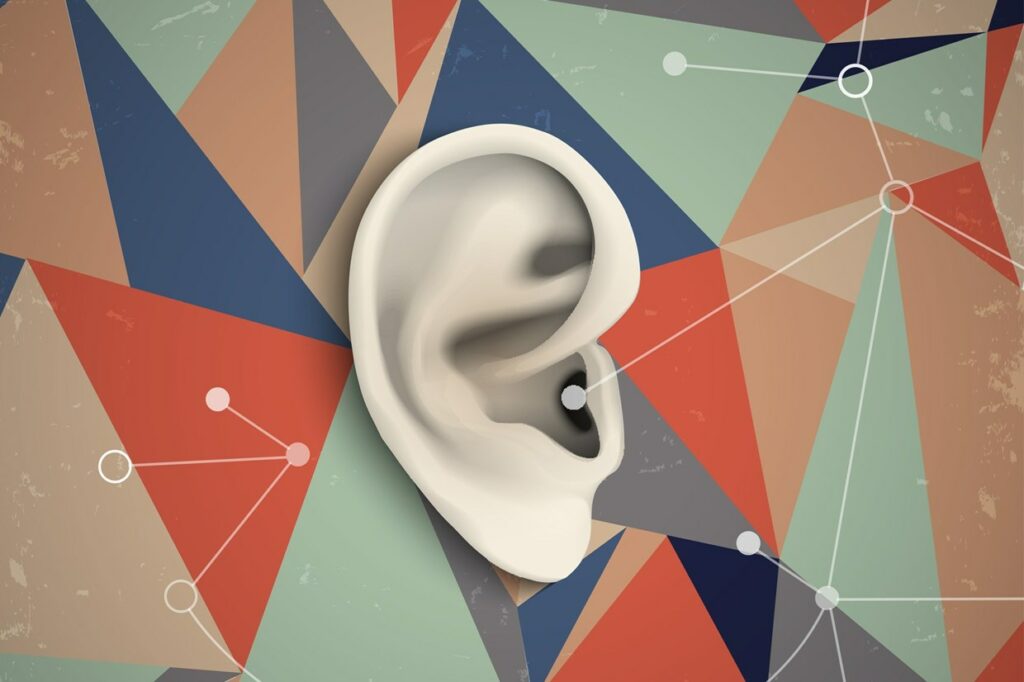In a new chapter published in The Sociological Review Monographs, Lisa Blackman explores how an interdisciplinary model and epigenetics can be helpful in understanding the impacts of trauma on voice hearing. Blackman uses the Hearing Voices Movement as an example of an organization that has challenged a biomedical perspective that pathologizes voice hearing.
“It has the potential to finally destabilize the biomedical model from its privileged seat and to allow new models of the biopsychosocial to take form,” writes Blackman, a professor at Goldsmiths, University of London.
Epigenetics is the study of how the environment affects gene expression, providing a more complex investigation into the often simplified nature or nurture debate. In her chapter, Blackman argues that epigenetics can be used as an innovative way to address “the question of how to approach and analyse the relationship between trauma, abuse, and voice hearing.” She writes that epigenetics “ holds the promise to challenge these issues, but only if the psychological and more relational and trans-subjective models of embodied subjectivity are invented.”
“The dominant psychological tradition of cognitive psychology and cognitive approaches such as CBT are those arguably least well equipped to explore the links between trauma, abuse and voice hearing with their reductionist models of mind and psyche,” asserts Blackman. She states, “Arguably what are needed are more trans-subjective conceptions of what it means to hear voices, which exceed individualistic notions of the clearly bounded and separate psychological subject.”
Using the concept of the “bio-psychological-social jigsaw,” Blackman critiques the common assumption that there are distinct aspects of experience that interact with each other, akin to pieces of a jigsaw fitting together. Blackman writes, “It is my argument that this framing is one that closes down on the promises of epigenetics to refigure what it means to hear voices.”
Blackman emphasizes the importance of listening to and learning from “experts by experience,” individuals who hear voices. In her chapter, Blackman provides a case example of Sharon, a woman who hears voices, to illustrate the impact of the Hearing Voices Movement and provide an example of how trauma can influence the experience of hearing voices.
Along with other scholars challenging the biomedical explanation for voice hearing, Blackman’s work provides an alternative for voice hearers to understand their experiences on their own terms and reject identities of ‘diseased’ or ‘deficient.’ Blackman argues that this paradigm shift “will only be possible with the development of less conservative and neo-reductionist psychological ontologies that allow, and are more open to processual models and conceptualizations of voice hearing that extend beyond atomized conceptions of the psychological self.”
****
Blackman, L. (2016). The challenges of new biopsychosocialities: Hearing voices, trauma, epigenetics and mediated perception. The Sociological Review Monographs, 64(1), 256-273. doi: 10.1111/2059-7932.12024 (Abstract)
















In and of themselves, the audios are just a curiosity. When many other perceptual curiosities are in place as well, then they have some kind of diagnostic significance, something the ordinary shrink never seems to grasp.
Report comment
I think in terms of “hallucinations” whatever way works best would be the way to go. Besides, if hallucinations are not a problem for a lot of people then they can’t be a problem for those people.
Maybe the idea behind “hallucinations” is that it’s possible to confirm a diagnosis with this type of “symptom”. Because it ‘suggests’ some type of neurological failure.
Report comment
First of all everyone hears voices, but lie and say they do not.
Our brain has been classified the following way.
1) Reptilian Complex / basal ganglia: Instinct (survival, breathing/swallowing/heartbeat, startle response)
2) Limbic System /Paleomammalian complex: Emotion (feelings, relationship/nurturing, images and dreams, play)
3) Neocortex (including the Prefrontal cortex)/Neomammalian complex: Thought (including planning, language, logic & will, awareness)
Listening too much versus listening too little.
People hear the voice of hunger, the voice of thirst. If people listen too much to the voice of hunger they suffer from Gluttony.
They hear voice to defecate, or the voice to micturate, or the voice to vomit. Only the homeless (might) listen to this voice and deficate and pee where ever they are. Everyone else lies and holds it in until they get to a toilet.
The voice of balance, which way is up which way is down, for the ability to walk/run or cross a stream. The voice of Vertigo.
They hear the voice of too hot and too cold. Example of cold mythbusters hand in cold water.
It is not cold is it? WHO makes you take your hand out?
https://www.youtube.com/watch?v=u4kvpjQe8nw
Is it too hot out? In summer when you feel the heat outside you hear the voice.
Is it cold out? In winter when you feel the cold you hear the voice.
Then you lie to yourself and go to work.
Hear the voice of suffocation “I cant breath” or “That smells terrible, I must get away to clean air.”
Voice of fatigue, I must sleep. If people listen too much they suffer from sloth.versus I must work/a workaholic so they never have time to listen to the other voices.
Voice of sex (Lust), I must reproduce. vs Chastity. Listen too much to lust and you get a STD, too little sex as in Chastity and you don’t have children and end your family tree. Rolling Stones ” I can’t get no” goes to this feeling/sin.
Voice of envy, “I must have that!”
Voice of anger, for example while driving a car “That guy cut me off!” versus being a pushover and having no anger.
Voice of fear. too much a coward, if too little fear then foolishly brave.
Voice of love, She loves you
The person who hears the voice “Today is your wife’s Birthday, do something for her” will not be on the news, but the man who listens to his voice of anger IS on the news for violence he chose to do.
“Hearing voices” is all a trick to support the power of psychiatry.
Report comment
Sometimes voices are just ideas, like when you are trying to think of a name, several pop up, but are incorrect, you reject the inaccurate words, but the word came from someplace in your mind. Ideas come from imagination.
If you have a lot of imagination, you can have a lot of voices (ideas). In a noisy urban environment it is difficult to focus on one, and make progress on one thing at a time.
Report comment
I agree with Markps2 generally. My wife has d.i.d. She would often tell me in the beginning of our healing journey together, “I have no idea what healing looks like.” So part of helping her heal was me figuring out how I, as a healthy adult, function. I realized that as I watched her and the other girls learn to interact that it wasn’t that they had ‘voices’ and I didn’t. It was a matter of degrees and the key factor of dissociation. My ‘voices’ have had nearly 50 years to learn to work together. It was only when I was confronted with stress or trauma or indecision, etc, in my life (and my wife’s disorder provided plenty of that in the beginning) that things got noisy in my head. But for my wife’s host and the other girls, learning to listen to various parts of her brain that each of the girls controlled was a new experience. So for the host especially, the noise was nearly unbearable ALL the time. But 8 years later as most of the ones in the system have learned to listen to each other and work together, they are becoming used to hearing each other.
Back to Mark’s comment. I believe people lie about hearing voices. In spite of our son’s involvement in his mother’s healing, he was aghast when I mentioned the voices in my head. Our culture has so pathologicalized the hearing of voices, that I’ve even been rebuked by others with d.i.d. for suggesting I hear them like they do as if hearing voices was some kind of badge of dysfunctional honor instead of simply a way all of us carryon our internal conversations.
Sam
Report comment
The psychiatric practicers believe dream queries and gut instincts are “voices,” according to my medical records. But the neuroleptics and antidepressants can both create actual psychotomimetic “voices,” via anticholinergic toxidrome poisoning. Definitely, there is a better approach to dealing with what doctors theorize to be “voices,” than giving people drugs already medically known to make a person “mad as a hatter.”
Report comment